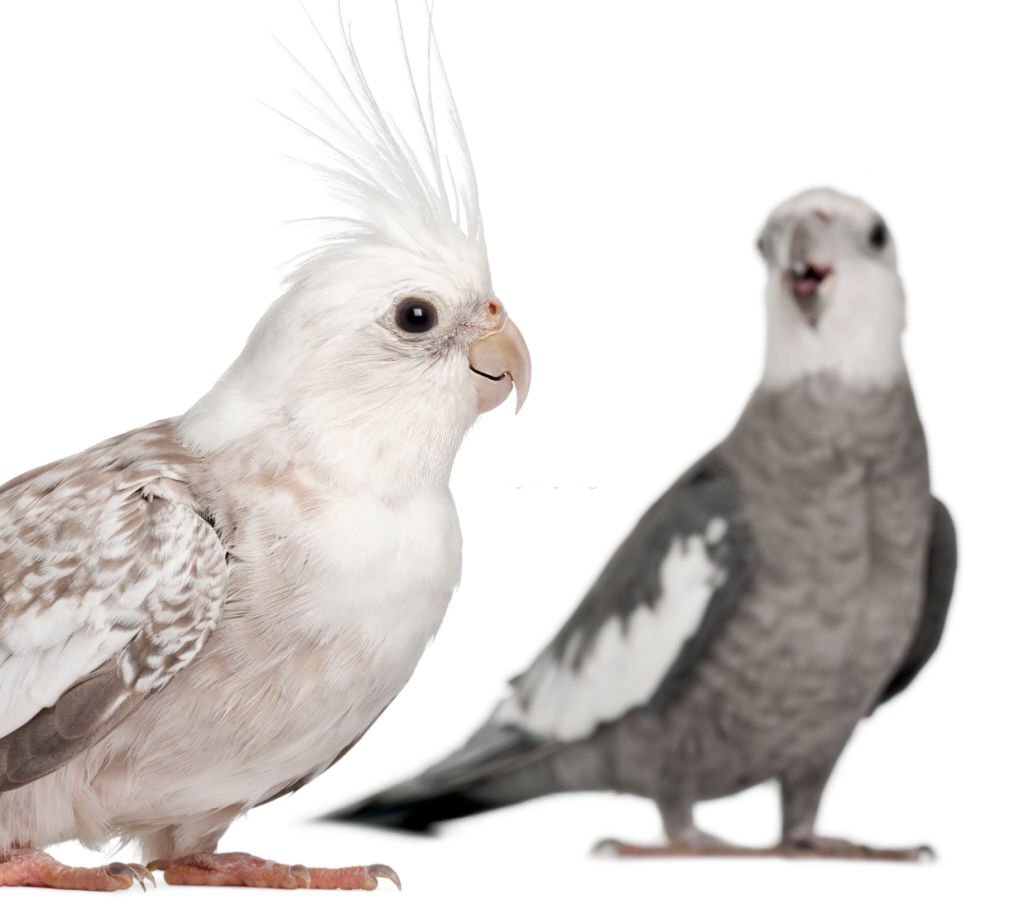Male and female cockatiels may exhibit slight differences in behavior and personality. Cockatiels are one of the most beloved pet birds around the world.
They have a charming character and can bring joy and excitement to their owners. However, male and female cockatiels may differ in their behavior and personality, so it’s important to know these variations before choosing the right bird for you.
In general, male cockatiels are more vocal and tend to whistle and mimic sounds more frequently, while females are usually quieter and more reserved. Additionally, males are often more territorial and may become aggressive towards other males during mating season. On the other hand, females tend to be more nurturing and affectionate towards their mate and may be better suited for breeding. Understanding these differences, along with other factors such as age and upbringing, can help you select the perfect cockatiel for your home.

Credit: cockatielcity.com
Physical Differences
Male Vs Female Cockatiels: Differences In Behavior And Personality
Cockatiels are a popular choice for pet owners due to their unique behavior and personality traits. While physical differences are not significant between male and female cockatiels, they still possess some distinguishable features. In this blog post, we will discuss the physical differences between male and female cockatiels, their relevant characteristics, and their impact on their behavior and personality.
Discussion On The Physical Differences Between Male And Female Cockatiels
Male and female cockatiels have some features that distinguish one from the other. The males are usually larger in size than the females, and the females have a wider pelvic bone structure than males.
Relevant Characteristics Such As Size, Coloration, And Feather Patterns
Size: male cockatiels are usually larger in size and have a wider head structure than females, but not by a considerable extent. The average length of both males and females is around 12 inches from the beak to the tail.
Coloration: male cockatiels generally display bright colors on their cheeks and color variations on their head, wings, and tail feathers. Females have a more subtle coloration, with duller color patterns than the male.
Feather patterns: male cockatiels have a distinct yellow and white pattern on their wings, while females have a gray and dull feather pattern.
Impact Of Physical Differences On Behavior And Personality
Behavior and personality of cockatiels are not exclusively dependent on their physical differences. However, environmental and genetic factors also play their part.
Male cockatiels are more outgoing, vocal, and interactive than females. They also tend to mimic human speech or other sounds better than females, which is why they are often favored as pets by their owners.
On the other hand, female cockatiels tend to be quieter and less attention-seeking. However, they are still affectionate and loving towards their owners.
Although physical differences between male and female cockatiels are not significant, they still carry distinctive features that set them apart from one another. The behavior and personality of each bird species are not exclusively dependent on their physical characteristics. Still, they play a contributing role, along with genetic and environmental factors.
Cockatiel owners and pet enthusiasts alike find joy in understanding and appreciating these beloved pets’ distinct characteristics.
Behavioral Differences
Cockatiels are lovable pet birds known for their playful and entertaining behavior. While male and female cockatiels share some personality traits, there are notable differences in their vocalizations and behavioral tendencies. Gender can also impact the way cockatiels interact with their environment and bond with humans and other birds.
Differences In Vocalizations And Behavioral Tendencies
- Male cockatiels are known for their musical vocalizations, and they tend to whistle and chirp throughout the day.
- Female cockatiels, on the other hand, have a more high-pitched voice, and they tend to screech less frequently than males.
- Male cockatiels are more likely to copy human speech and sounds, and they enjoy repeating words and phrases.
- Female cockatiels tend to be more reserved and prefer to communicate with their body language.
- Male cockatiels also tend to be more outgoing than females and enjoy exploring new surroundings.
- Female cockatiels prefer to stick to their familiar surroundings and may be more timid around new people or environments.
Discussion On How Gender Impacts The Way Cockatiels Interact With Their Environment
- Male cockatiels are more adventurous and curious, and they tend to explore their surroundings with enthusiasm.
- Female cockatiels tend to be more cautious and observant, and they may take some time to get used to new environments.
- Female cockatiels are known for their nesting behaviors and may become territorial when they have eggs or babies.
- Male cockatiels tend to be more social and enjoy spending time with other birds, while females are more independent and prefer to spend time alone.
How Gender Affects The Way Cockatiels Bond With Humans And Other Birds
- Male cockatiels tend to form stronger bonds with their human owners and may become more attached to them than female cockatiels.
- Female cockatiels are more independent and may not require as much attention or affection from their human owners.
- Male cockatiels may also become territorial and aggressive towards other birds, while females tend to be more accepting of other birds.
- Female cockatiels may bond more closely with other female birds than males do.
Personality Differences
Male Vs Female Cockatiels: Differences In Behavior And Personality
Cockatiels are delightful and lovely birds that make great pets. They are playful, affectionate, and have distinct personalities. However, it is essential to understand that their behavior and personality traits vary based on their gender. In this section, we will discuss the gender differences in cockatiel personality and how it affects their trainability and ease of handling.
Discussion On How Gender Influences The Innate Traits And Tendencies Of Cockatiels
Gender plays a critical role in shaping the innate traits and tendencies of cockatiels. As a result, male and female cockatiels exhibit unique personality characteristics.
Highlighting Common Personality Traits Of Male And Female Cockatiels
Male Cockatiels
- Male cockatiels are charming and confident birds with dynamic personalities.
- They are social and love attention from their owners, but they can also be territorial at times.
- They tend to be more vocal and enjoy mimicking sounds such as whistling, singing, and even speaking.
- Males are more likely to learn new words and tricks, making them excellent entertainment and companions.
Female Cockatiels
- Female cockatiels are sweet and gentle birds that enjoy cuddling and napping.
- They tend to be quieter than male cockatiels and have a softer chirp.
- Females can be more independent, making them less demanding of attention than males.
- They are nurturing by nature and may develop a loving bond with their owner.
Differences In Trainability And Ease Of Handling Between Genders
Male and female cockatiels can both be trained and taught how to perform tricks, but there is a difference in trainability and ease of handling.
Male Cockatiels
- Male cockatiels are more confident and outgoing, which makes them less prone to stress, fear or nervousness in new situations.
- Males are more energetic and curious, so they enjoy exploring and learning new things that challenge their mental and physical abilities.
- They are highly trainable and enjoy bonding with their owners through learning new tricks or words.
Female Cockatiels
- Female cockatiels are more docile and gentle, which makes them more prone to stress and anxiety in new situations.
- They require a more patient and gentle approach when training, as they may be easily overwhelmed or intimidated.
- Females may take longer to learn new tricks or words, but with proper training techniques and patience, they can excel in learning new things.
Overall, both males and females make great pets and have unique personalities that make them delightful companions. Understanding gender-related differences in cockatiels can help pet owners choose and care for their birds appropriately.
Health Differences
Overview Of Common Health Issues That Affect Male And Female Cockatiels Differently
Cockatiels are known for their playful and cheerful personalities. However, like any living creature, they are also susceptible to illnesses and health issues. Both male and female cockatiels can suffer from similar health problems such as feather plucking, respiratory infections, and bacterial or fungal infections.
However, there are some health issues that affect male and female cockatiels differently.
- Females have a higher risk of egg-binding, which is a life-threatening condition that happens when an egg gets stuck in the reproductive tract. Without proper treatment, the egg-binding can cause death in female birds.
- Males, on the other hand, have a higher risk of tumors or cysts in the reproductive system, which can cause discomfort and can be life-threatening in severe cases.
- Males also tend to have more aggressive behavior, which can lead to self-mutilation and injuries.
Insight Into How Gender Affects Breeding, Egg-Laying, And Overall Health Of Cockatiels
Gender plays a crucial role in the reproduction and overall health of cockatiels. Breeding can be different for male and female birds, and their health needs also vary.
- Females are responsible for laying eggs, and their reproductive system can be at risk if breeding is not done carefully. Over-breeding can deplete their nutritional reserves, making them more susceptible to health problems.
- Males are known for being aggressive during mating periods, and they can become territorial and overly protective of their mates. They can also harass the female bird by continuously trying to mate, which can lead to exhaustion and stress for the female.
To ensure that both male and female cockatiels maintain their health, it is essential to provide them with a proper diet, regular exercise, and clean living space. Giving them access to a balanced diet of fruits, vegetables, and protein-rich food can ensure that their bodies are getting essential nutrients.
Regular grooming and providing ample opportunity for exercise and playtime can help keep them healthy and prevent self-mutilation behavior.
Discussion On How To Best Maintain Each Gender’S Health Needs
- Females need extra care during breeding season. They should have a well-balanced diet, with a higher percentage of calcium and vitamin d, which is essential for developing strong eggshells.
- Females should be watched for signs of egg-binding, such as lethargy, discomfort, and loss of appetite. Immediate veterinary attention should be sought if any of these signs occur.
- Males need attention to their reproductive system. Regular check-ups with a veterinarian can help catch any cysts or tumors before they become severe.
- Providing male birds with ample opportunities for mating can help reduce aggressive and territorial behavior.
- Keeping their living space clean and free of bacteria and germs can help reduce the risk of respiratory infections.
Maintaining the health of male and female cockatiels requires specific attention to their unique needs. Regular veterinary check-ups, a balanced diet, exercise, and grooming can help keep them in good physical health. Recognizing the signs of potential health problems and seeking immediate veterinary attention can be life-saving for these cherished pets.
Frequently Asked Questions For Male Vs Female Cockatiels: Differences In Behavior And Personality
What Are The Behavioral Differences Between Male And Female Cockatiels?
Male cockatiels are more vocal and active than females. They also tend to be more territorial and protective of their cages. Meanwhile, female cockatiels are more docile, reserved, and quieter than their male counterparts.
What Are The Personality Differences Between Male And Female Cockatiels?
Generally, male cockatiels are more outgoing, playful, and social than females. They are more likely to seek attention, enjoy being petted, and show affection to their owners. Female cockatiels, on the other hand, are usually more independent, cautious, and less affectionate.
Do Male And Female Cockatiels Have Different Reproductive Behaviors?
Yes, male and female cockatiels have distinctive reproductive behaviors. Male cockatiels usually whistle, sing, bob their heads, and spread their wings to attract female cockatiels. Meanwhile, female cockatiels may start producing eggs, nesting, and laying eggs soon after they mate with a male.
Are Male Or Female Cockatiels Better Pets?
There is no definitive answer to this question. It really depends on individual preferences and circumstances. Male cockatiels may be more playful and sociable, but they can also become territorial and aggressive towards other birds. Female cockatiels may be more reserved and independent, but they can also be less engaging and affectionate.
Can Male And Female Cockatiels Coexist Peacefully?
Male and female cockatiels usually get along well, especially if they are raised together or introduced gradually. However, there may be some territorial or mating-related conflicts, especially during breeding season. It’s important to provide enough space, food, and toys for each bird and supervise their interactions to prevent aggression or harm.
Conclusion
Ultimately, understanding the differences in behavior and personality between male and female cockatiels is key to building a strong and lasting bond with these feathered friends. While males may be more vocal and outgoing, females tend to be more independent and reserved.
However, with patience and consistent training, both male and female cockatiels can become loving, affectionate companions. It is important to remember that each bird has its own unique temperament and preferences, regardless of gender. By providing a stimulating environment, offering favorite treats, and showing affection through gentle handling and positive reinforcement, you can create a deep and fulfilling relationship with your cockatiel.
As with any pet, it is important to do your research and be prepared to provide the necessary care and attention to ensure a happy and healthy life for your feathered friend.
Latest Posts
The Ultimate List: Top 8 Best Birdwatching Podcasts for Avid Birders
Looking for the top birdwatching podcasts? Here are the eight best options to tune into today! Birdwatching can be a thrilling, immersive experience that brings...
Stop Squirrels in Their Tracks: 10 Effective Ways to Safeguard Your Bird Feeder Pole
To prevent squirrels from climbing your bird feeder pole, use squirrel baffles and slippery poles. Here are ten effective ways to keep squirrels from stealing bird food and damaging bird feeders. ...


